"The internet is made of demons"
Also, is it kosher to eat a Minion?
I saw this tweet about how legacy media reporters refuse to engage with TikTok, so I’m watching more TikTok now. Like, yeah I totally run a pop culture newsletter and don’t engage with the biggest trendsetting app in the world lol. I repent!
Yes, I’m aware that I had to read a tweet that had an embedded TikTok to really deal with the fact that people like me only engage with TikTok via Twitter. We’ve done the full ouroboros.
I tried to get into TikTok a few months ago and wasn’t much of a fan, but it’s gotten to know my taste a little better and now I’m having a good time. This is the first social media experience I’ve had where I can feel it doing damage to me immediately and in real time — unlike Twitter where it was more of a slowly boiling frog situation.
I have no intention to start posting videos, but if you want to add me and share your favourite TikToks, I’m @ModernRelics.
Anyway, let’s talk about how the internet is demons.
Indeed, the internet is made of demons
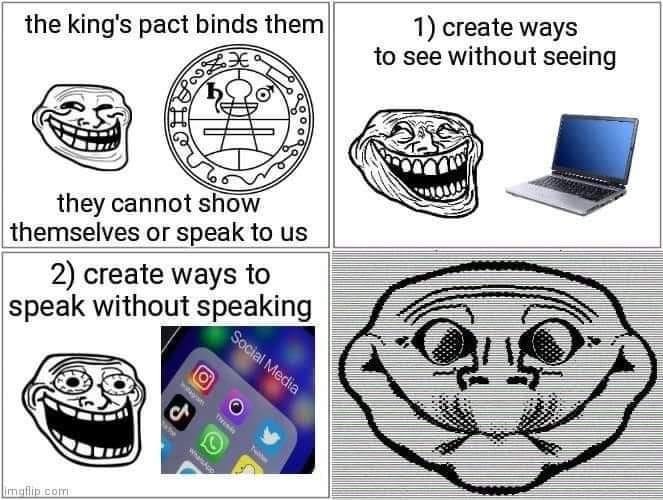
Until NASA released the James Webb telescope images (more on that later), Twitter this week was completely feral. Why was the discourse about a white woman making a noodle recipe book so vicious? Why are we arguing about whether Anne Frank had white privilege? This was the context in which I read this book review from Damage Magazine. I was first struck by its funny title, then found the whole thing pretty interesting.
In the review, literally titled The Internet is Made of Demons, writer Sam Kriss says that due to algorithmic incentive structures, we’re encouraged to act cruelly and with uncanny uniformity. Instead of empathy, we’re incentivised to dehumanise each other.
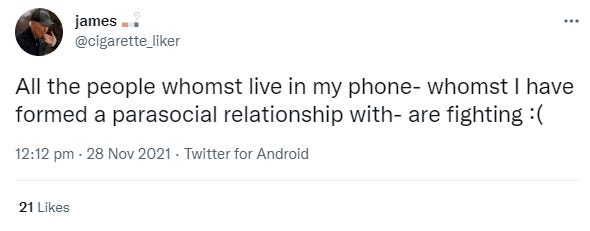
In the philosophy of Emmanuel Lévinas, your ethical responsibility to other people emerges out of their face, the experience of looking directly into the face of another living subject. “The face is what prohibits us from killing.” Elsewhere: “The human face is the conduit for the word of God.” But Facebook is a world without faces. Only images of faces; selfies, avatars: dead things. Or the moving image in a FaceTime chat: a haunted puppet. There is always something in the way. You are not talking to a person: the machine is talking, through you, to itself.
It even leaks into our physical world. Just today an ABC article about a viral TikTok stunt spread through Australian Twitter. TikToker Harrison Pawluk collected over 57 million views for a video of him giving a bunch of flowers to a woman sitting by herself in a shopping centre. But the woman — Maree — felt patronised, and said in an interview after reading a tabloid article about the video, “I felt dehumanised”.
I think it was probably thoughtlessness rather than mailice that caused Harrison to see Maree as a means to create content, rather than a complex human being. The systems in place discourage reflection and empathy, and that has the potential for harm.
I’m a (relatively) young person active in the Uniting Church, which is a rapidly ageing Christian denomination grappling with a constantly evolving digital world. I’ve worked for the church in a digital strategy role in the past, and now I do this, so I get asked pretty often, “How should the church engage online? What should we do?”
I’ve said before that part of the answer is developing a theology of what happens online, and a big part of that — as Sam Kriss identifies — is learning what it means to love your neighbour on the internet. Who is my neighbour, and how do you love them when all you can interact with is a disembodied simulacrum of the real person using another screen?
I’m being over-dramatic, and unlike Sam, I don’t believe the internet and the demon are necessarily one and the same. I believe the internet magnifies the best and worst of human nature — if there are any demons online, they originate within us — but I agree the inscentives of the algorithm and capital tug on us to behave in destructive ways.
I have made many tangible, positive, life-changing (and hopefully lifelong) friendships with others online, particularly via digital video. But the background hum behind every digital culture piece I read is this question of the dehumanising forces of technology – an anxiety that’s not unique to the technology of the internet either. It’s entirely appropriate to apply the tools of theology to the problem.
So, there’s a free masters thesis idea, or if someone wants to give me a scholarship to do it myself drop me a DM.
Shinzo Abe’s Unification Church links
We all know I am an avid Garbage Day reader, (it’s no secret my own newsletter’s format is directly inspired by it).
Ryan Broderick’s analysis about Shinzo Abe’s assassination and how his prime ministership parallels and contrasts with that of Donald Trump’s presidency (especially when it comes to leveraging online hate and outrage for political ends) is well worth a read. Plus, a fact I’ve just been reminded of: to some degree, Abe was affiliated with the Korean Unification Church. I’ve written before about how Trump regularly addresses their events.
The ABC has a great piece about the religious angle to the assassination.
Is it kosher to eat a Minion

@zarazahavahReplying to @katierab also this comment was left by my sister everyone say hi katie #jewish #jewishtiktok #jewishcheck #jewishgirl #jewishthings #minions #minionsriseofgru #minionsriseofgru #zarazahavah

Tiktok failed to load.
Enable 3rd party cookies or use another browser
My friend Travis sent me this incredible video this week from @zarazahavah, a Jewish TikToker who addresses Jewish theology as it relates to news and popular culture. It’s wild to see her same machine gun delivery applied to eating Minions as to whether it’s moral to have an abortion.
Also she posts a lot about wanting to nuke the moon.
NASA’s happy snaps
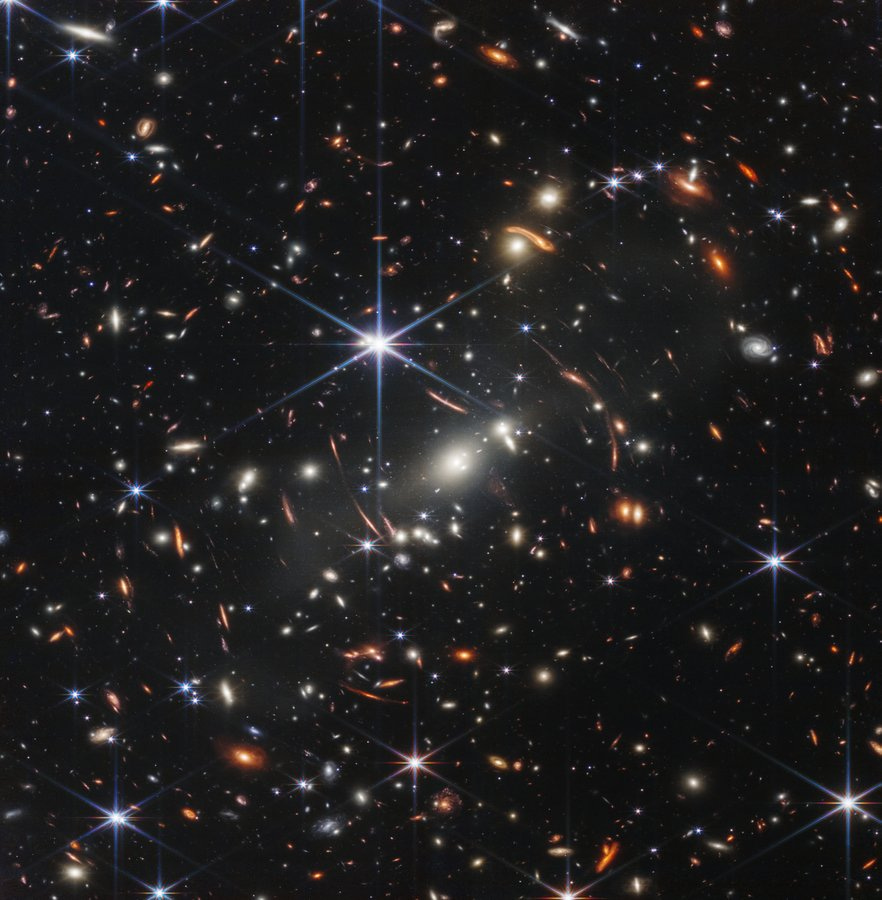
NASA released the first images from the James Webb Space Telescope this week and they are genuinely breathtaking. I’m excited for all the things this new tool will help us learn, because looking at things millions and billions of light years away means you are literally looking through time.
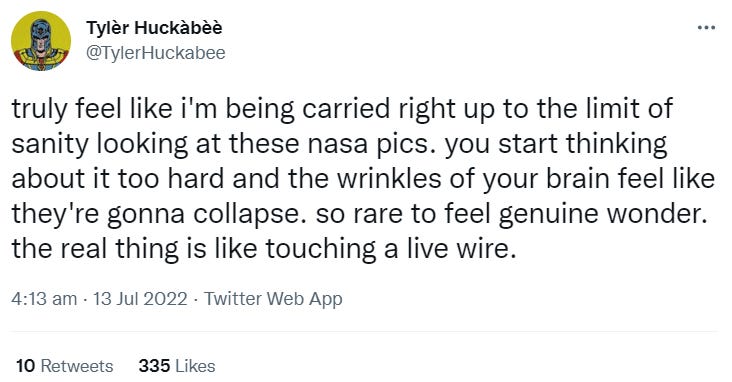
It also kicked off more speculation about extraterrestrial life, and whether there’s an alien space Jesus. Poor @telowery22 did a good tweet and ruined his own mentions. I recommend taking a look at the replies — they run the gamut of views.
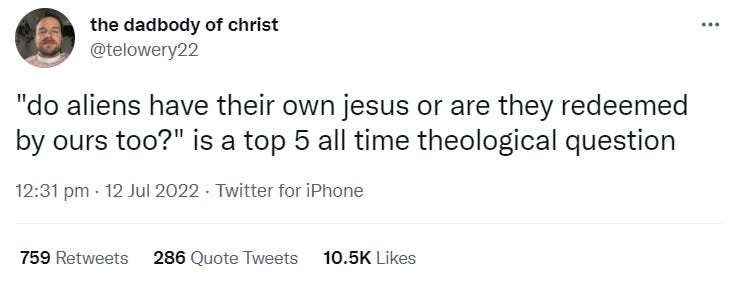
The images also kicked off another round of “we are all stardust” posts, which are normally a bit of a vacuous sentiment for me tbh, but I’ll allow this once because the emission of carbon from dying stars is one of the more striking features of NASAs images. Also this lovely drawing by Gold Coast artist Samuel Leighton-Dore is giving me memento mori vibes.
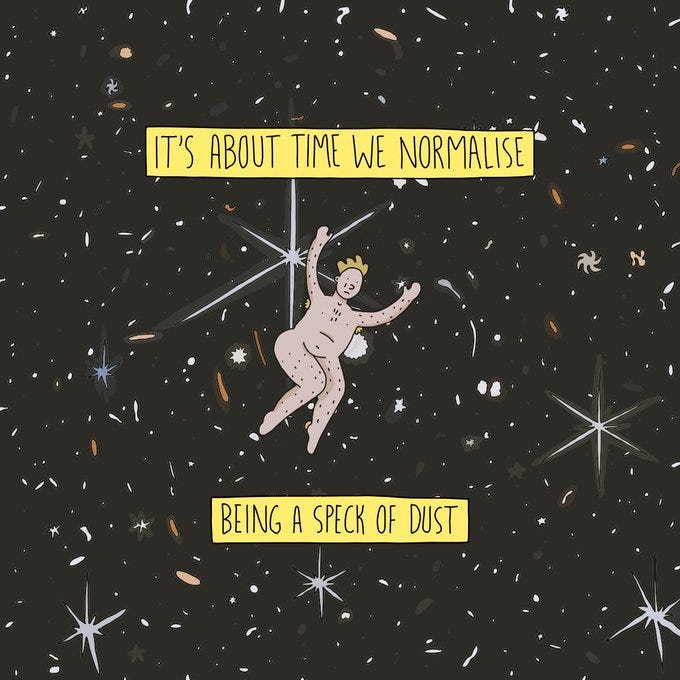
ABC Science has a great article explaining a lot of this stuff!
Jordan Peterson weighs in on religion… again
I hate to draw attention to someone with so little to offer, but I’ll briefly note that this happened. You are welcome to find the full, original video if you want but it sucks and you’re better off just watching the clip above — way funnier. There’s also one for Muslims and it’s just as cringe as you’d imagine.
If I add anything more this post will be too long for email :) Sorry I typed too much :) And added too many links :)
If I get time I’ll do a bonus post of posts. Sorry! Bye!


